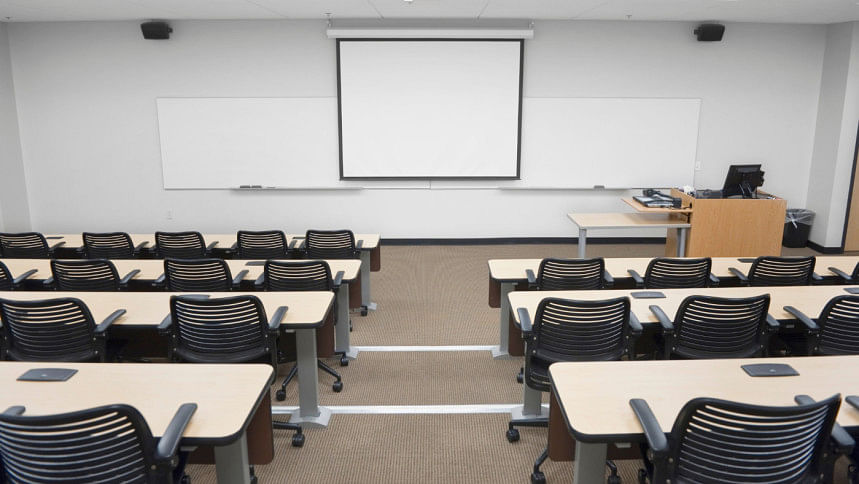The tough road to university teaching: What aspiring educators must know

Imagine walking into a classroom filled with eager students, ready to absorb knowledge. A new university lecturer stands at the front, feeling a mix of excitement and nervousness. The weight of shaping young minds is both a privilege and a challenge, one that holds deep responsibility.
In Bangladesh, the experience of becoming a university lecturer is a story of both passion and hardship, filled with highs and lows that often go unnoticed by outsiders. It is a profession that demands more than just academic expertise; it requires emotional intelligence, resilience, and a constant battle against societal, commercial, and corporate pressures.
On the first day as an educator, with a timid heart, I, Dr Tarnima, began my academic journey at Universiti Malaysia Pahang Al-Sultan Abdullah in Malaysia, knowing that this would be the profession I would love to die with. As I was among the students, with their inquisitiveness and talents, and with their youthful aura, I felt a vulnerability that brought me to that point of achieving my passionate goal with integrity and honesty.
My first class was with my Management Information System (MIS) students, and it took place in the MIS Lab, where the interactive sessions of teaching and learning created a magical atmosphere. Interestingly, being a foreign faculty member, I also found students from diverse backgrounds and various countries and communities. These highly spirited students also taught me a lot of things about their culture, their mindset about their society, country, and the world.
After five years of teaching, I started working as a postdoctoral fellow at Universiti Sains Malaysia (USM) and also worked as a faculty member for the simulation lab classes of the Strategic Human Resources Management Course. USM brought in simulation learning, and MonsoonSIM was applied in the course to make the learning process more engaging and effective.
Bangladesh's educational system has been evolving, and university lecturers are at the heart of that transformation. However, the challenges the educators face in this profession often stem from too much engagement, other work activities at the universities, lack of preparation, and an underestimation of the emotional and intellectual demands of the role, and these realisations popped up while working as an assistant professor at BRAC University in Bangladesh.
As a CIM expert and a Research Assistant, I, Dauwood Ibrahim Hassan, have observed certain characteristics that any faculty member needs to carry, and also have comprehended the kind of efforts, in-depth, preparations, highest integrity, honesty, emotional intelligence, humanitarian values, and patience are highly needed for this role. Besides, research activities are also required for growth for an educator. In this role, everyone has to be constantly motivated. My experience in this academic world has been for about two years only, and I believe that the more I am learning, the more I wish to dive in.
The insightfulness and deeper understanding of certain challenges become essential as an educator and as a researcher so that a broader society receives the contribution to shape the next generation. Before stepping into the role of a university lecturer, aspiring educators must understand the complexities that lie ahead. The profession may appear glamorous from the outside, but it is laden with expectations that often go unnoticed until one is already entrenched in the daily grind.
One critical aspect is the transition from being a student to a teacher. Aspiring lecturers must realise that their responsibility extends beyond just delivering lectures. Their role is to engage with students, to mentor, to inspire, and often to console.
In many cases, university lecturers in Bangladesh face a disconnect between the theory they teach and the realities students experience outside the classroom. This gap can be a source of frustration if not approached with empathy and adaptability. The famous poet William Wordsworth himself claimed, "Every great Poet is a Teacher: I wish either to be considered as a Teacher, or as nothing." It is in just such a letter, written to Sir George Beaumont, that he most forcefully claims his didactic faith.
Several new lecturers make the mistake of focusing too much on their academic credentials and not enough on their teaching methods. They may struggle with time management, balancing research and teaching duties, or coping with the administrative tasks that often consume a significant portion of their time. A critical example is the lack of support systems within many educational institutions in Bangladesh. New lecturers often feel isolated, overwhelmed, and underappreciated, leading to burnout and disillusionment.
One of the most painful yet common experiences is the hurdles to motivating the students who are disengaged. While this issue is not unique to Bangladesh, the societal pressure placed on students to excel often results in a robotic approach to education. Lecturers must grapple with this issue daily, fighting against the tide of rote memorisation and the pressure of exam-centric education. However, there are positive examples to learn from. Some institutions and educators are pioneering changes by integrating active learning techniques and encouraging critical thinking. Aspiring lecturers should embrace these innovations, which require them to challenge the traditional norms of teaching and adopt more interactive, student-centred approaches.
If these challenges are left unaddressed, the consequences could ripple far beyond the walls of the classroom. The societal effects would be profound. A lecturer who is not emotionally supported or adequately trained could easily become disengaged, negatively impacting students who depend on them for guidance. Over time, this lack of enthusiasm and expertise can create a generation of students who are poorly equipped to face the challenges of the corporate world or contribute to the socio-economic development of Bangladesh.
In the corporate world, employers rely on graduates to bring critical thinking, creativity, and problem-solving skills to the table. If university lecturers fail to adapt to the evolving needs of students, the gap between academic knowledge and practical application will continue to widen. This disconnect will hinder national progress, impacting everything from industry innovation to public policy.
As the sun sets on the bustling university campuses of Bangladesh, aspiring university lecturers should reflect on the gravity of their chosen profession. It is not merely about teaching; it is about transforming lives, building futures, and contributing to the nation's progress. If the issues discussed here are addressed with introspection and proactive action, the future holds immense potential. The path is not without obstacles, but the journey is profoundly rewarding. Together, we can shape a brighter future for Bangladesh, one lecture at a time.
Dr Tarnima Warda Andalib is working as an assistant professor in BRAC University, Dhaka, as well as a global consultant director at Oxford Impact Group, UK.
Dauwood Ibrahim Hassan is a research assistant at BRAC University, and a fresh graduate of Marketing and CIM, with a keen interest in digital marketing, content creation and data analysis.

 For all latest news, follow The Daily Star's Google News channel.
For all latest news, follow The Daily Star's Google News channel. 









Comments